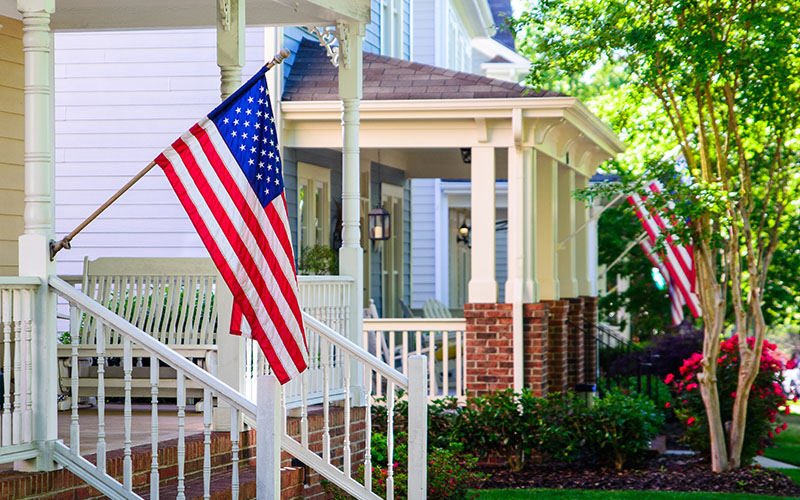Unenforceable HOA rules are more common than many homeowners and board members realize. In Virginia, some HOA rules violate the law and infringe upon the rights of owners. While associations have the authority to govern communities, they must still adhere to state laws, the governing documents, and established due process.
What are Unenforceable HOA Rules in Virginia?
Virginia law sets limits on what an HOA can regulate. If an HOA passes a rule that contradicts the law or infringes on certain rights, that rule may be legally invalid. Here are five specific unenforceable HOA rules under the Virginia Property Owners Association Act.
1. Banning the Display of the U.S. Flag (Section 55.1-1820)

Homeowners have the right to display the United States flag on their property. Virginia law makes it clear that an HOA cannot adopt a rule that outright prohibits this display.
The association may create reasonable restrictions on the placement and size of the flag or flagpole, but it cannot ban the display itself. Any HOA rule that forbids flying the U.S. flag is unenforceable.
2. Prohibiting Solar Energy Devices (Section 55.1-1820.1)
Associations can’t ban homeowners from installing solar energy collection devices on their property. Virginia law allows reasonable restrictions related to appearance, location, or structural safety. That said, any blanket prohibition on solar panels violates the law.
3. Outlawing Home-Based Businesses (Section 55.1-1821)

The law protects homeowners who operate legitimate, low-impact businesses from their homes. As long as the business complies with zoning laws and does not disrupt the neighborhood, the HOA may not ban it outright.
Associations can regulate signage, customer visits, or traffic, but they can’t stop someone from running a home-based business altogether. A rule stating “no business activity in homes” is unenforceable under this statute.
4. Prohibiting the Use of For Sale Signs (Section 55.1-1822)
Homeowners in Virginia have the right to place a standard “For Sale” sign on their property when listing their home. An HOA has no authority to forbid this practice.
That said, the law allows an association to adopt rules on size and placement, but not on the right to advertise the sale. A rule banning yard signs entirely, including real estate listings, is in direct violation of the law. For this reason, an HOA can’t enforce such a rule.
5. Banning Electric Vehicle Charging Stations (Section 55.1-1823.1)

Virginia law protects the right of homeowners to install electric vehicle (EV) charging stations on their own property. Associations may place reasonable restrictions on placement or appearance, but they have no power to deny permission altogether.
If a rule says EV stations are prohibited in all forms, it is considered unenforceable. The homeowner can challenge that rule, primarily if the installation occurs on their own property.
What Constitutes Unenforceable HOA Rules?
Some homeowners may not agree with the association’s rules, but not every unpopular rule is illegal. So, what exactly makes a rule unenforceable?
Here are the traits that constitute unenforceable HOA rules.
Conflicts With the Law
The most apparent type of unenforceable rule is one that directly conflicts with federal, state, or local law. For example, if an HOA has an outright ban on satellite dishes, the rule is enforceable because it conflicts with the federal OTARD Rule.
In Virginia, the Property Owners Association Act clearly states what HOAs can and cannot do. If a rule bans something that the law protects, like solar panels or the U.S. flag, it is unenforceable.
Conflicts With Governing Documents
Even if a rule doesn’t violate state law, it can still be void or unenforceable if it contradicts the HOA’s governing documents. The hierarchy of HOA documents usually follows this order:
- Federal and state law
- Declaration (CC&Rs)
- Articles of incorporation
- Bylaws
- Rules and regulations
Rules and regulations should not override or conflict with the declaration. If they do, they are not valid. For example, if the CC&Rs allow home offices, an operating rule that bans them is unenforceable.
Discriminatory Rules
An HOA can’t adopt or enforce rules that discriminate against protected classes. Discriminatory rules are a violation of the federal Fair Housing Act and state-level fair housing laws. Protected characteristics include race, color, religion, sex, disability, national origin, and familial status.
Board members must practice caution when enacting potentially discriminatory rules. Even if the intentions behind the rule are good, language can throw everything off course. For example, a rule stating “No children allowed in the pool after 5 p.m.” can be construed as discriminatory based on age.
Other examples of discriminatory rules include: “Units may not be rented to people with disabilities,” and “Only English may be spoken in common areas.” These types of rules are illegal, and the HOA may face serious penalties for enforcing them.
Enacted Improperly
Homeowners associations must follow specific procedures and requirements to enact a rule. State laws and the HOA’s governing documents should outline these procedures. If an HOA board adopts a rule in a way that is inconsistent with procedures, the rule can be deemed unenforceable.
Most of the time, when adopting a rule, HOAs must provide advance notice to homeowners, discuss and vote on the rule at an open board meeting, and allow owners to comment on the proposal. Changes to operating rules only require a board vote or resolution, but amendments to the CC&Rs or bylaws typically require a membership vote.
If the board creates a rule without following this process, homeowners can challenge the validity of the rule. Board members can’t just pass a rule and send an email about the change on a whim.
Selectively Enforced
Board members must enforce the rules fairly and consistently. If the HOA applies a rule to homeowners in an arbitrary manner, it may lose the authority to enforce that rule altogether. The HOA board must also implement all rules consistently, not just a select few that they deem convenient.
The Bottom Line
Every HOA has the power to create rules, but this power is not without its limitations. In Virginia, unenforceable HOA rules include those that conflict with state law, infringe on homeowners’ rights, or come into existence through a procedurally flawed process.
National Realty Partners is a leading provider of HOA management services in Virginia. We help communities thrive. Call us today at 703-435-3800 or request a proposal online to get started!
RELATED ARTICLES:
- What Is The Virginia Property Owners Association Act?
- HOA Attorney: How Can They Help The Association?
- The Impact Of Federal Laws On HOAs
